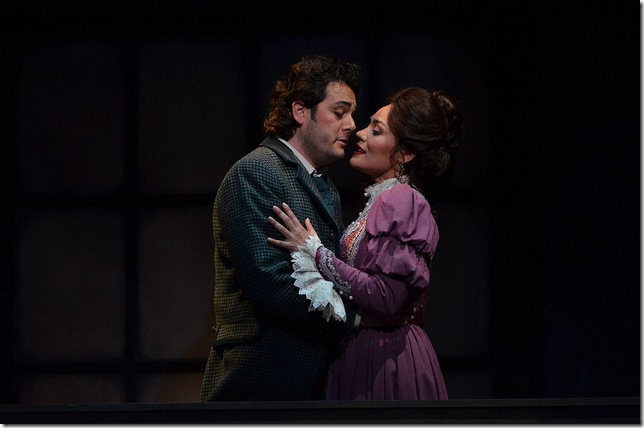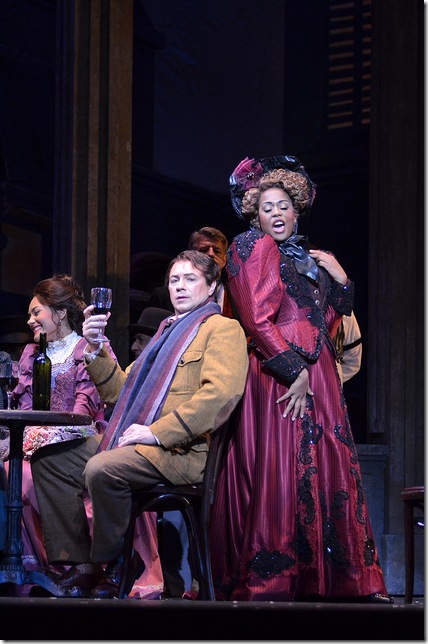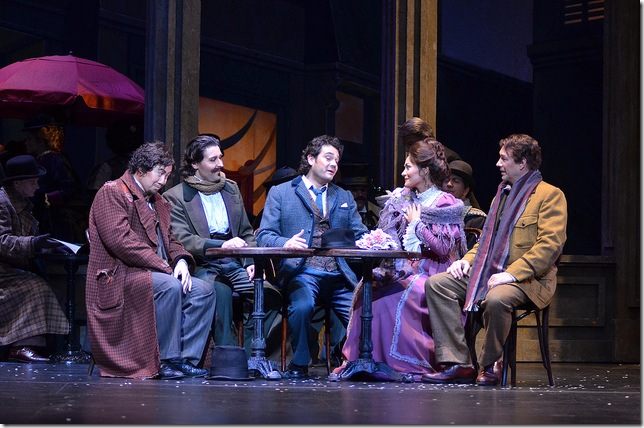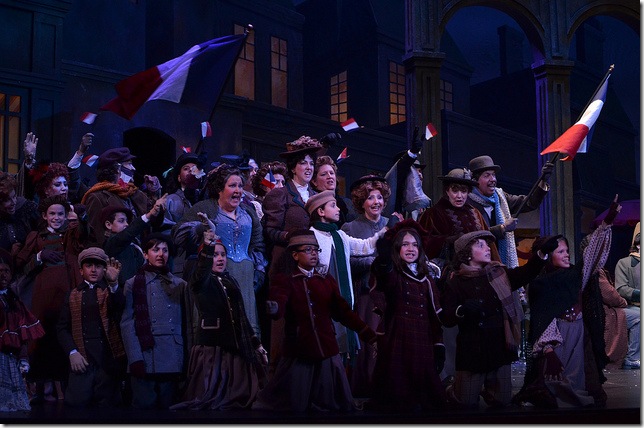The opera that Giacomo Puccini and his librettists concocted from Henri Murger’s La vie de Bohème has been one of the most beloved of all operas since its premiere in 1896, and in the century and more that’s followed, it’s become pretty much indestructible.
The current production of La Bohème at Florida Grand Opera is as traditional a production as you could wish for visually, and if the scenery borrowed from the Lyric Opera of Kansas City didn’t have the opulence of the Franco Zeffirelli production with which its Ziff Ballet Opera House audience Wednesday night might have been familiar, they nevertheless received it with open arms and generous applause.
This opera’s singing roles provide a fine stepping-off point for some careers, and a point of arrival for other singers who discover that their voices are best-suited for lyric parts. This La Bohème is most distinctive for its Mimi, the Chicago-born soprano Ailyn Pérez, who in her fresh-voiced, endearing reading of the role makes as good and memorable a Mimi as I’ve seen in some time.
She does this in part with her fine acting skills, but primarily through the loveliness of her singing. It’s not an overwhelmingly large voice, but it’s beautiful throughout its entire register, from an easy, open top and a surprisingly strong, prettily colored bottom that projects almost as powerfully as her higher notes. She sang Wednesday night without difficulty, with no sound of strain on the offstage high C at the end of Act I, and a big, generous quality in that key moment in her first aria, Mi chiamano Mimi, when she sings that April’s first kiss is hers (Il primo bacio dell’aprile è mio).
She was every bit as compelling in the Addio, senza rancor duet that closes Act III, with an ability to project sincerity and tenderness through the basic bloom of her voice, deployed with thorough musicality and scrupulous evenness. That musical discipline came in handy at several dramatic points where conductor Ramon Tebar indulged an unpersuasive late-Romantic slowing down and stretching out of the music; she was watching him like a hawk and she made it work, flaccid though the overall effect may have been.
As an actress, she was believable at all times, from her canoodling in the Act II Café Momus scene with Rodolfo to her rag-doll inertia in Act IV, and the impression she gave the viewer at the end was of having encountered someone special and delicate who flits through your life, momentarily brightening it, before leaving all too soon. I think that was part of Puccini’s intent, and Pérez fulfilled it perfectly.
As Rodolfo, the Mexican tenor Arturo Chacón-Cruz was decent, but the reediness of his voice has little warmth, and it tended to sound strident, particularly in the first act, when he oversang his early entrances and was somewhat at sea intonation-wise. He handled all his aria responsibilities ably and with plenty of lung power, but he hasn’t yet added enough softer shades to his vocal portfolio, and this kind of intimate, highly personal music needs it.
In last season’s Romeo et Juliette at Palm Beach Opera, Chacón-Cruz’s considerable vocal stamina came in handy for Gounod’s wordy Romeo, but as the lovelorn poet of the Puccini’s garret he didn’t seem to be able to modulate his voice much, or vary it enough for the changes in mood. His acting was acceptable but also seemed preoccupied and not very natural, though both his singing and acting were better with Pérez than without her.
In the secondary roles, Mark Walters, an excellent Rigoletto last season at FGO, made a very fine Marcello, with a strong, creamy baritone that gave his lines richness without robbing them of definition. His singing was particularly nice in the Act IV duet with Rodolfo, O Mimi, tu più non torni, in which he was able to convey a real feeling of regret. He was somewhat too remote in his acting with Musetta; one wants him to be more engaged with this hussy who keeps throwing the train of his life off the rails, but he always seemed to be taking several steps back.
As Musetta, the young American Brittany Ann Renee Robinson made a pleasant effect, though not much more than that. She’s a good singer with a memorable voice, as she showed in a secondary role in last season’s La Rondine, and her singing was accurate and attractive. But probably because she’s a relative newcomer to the stage, she was overly cautious vocally and dramatically.
Her Quando men’ vo in Act II was pretty, but needs much more personality; this is a person with an outsize love of life, and she needs to be sung and acted that way. Robinson often seemed Wednesday night to have figured out what moves she wanted to make in both directions, but hadn’t yet gotten comfortable with the role.
In the ancillary roles of Schaunard and Benoit/Alcindoro, both Ryan Milstead and Craig Colclough, respectively, performed ably, but the real find here was Adam Lau as the philosopher Colline. Lau, a Californian, has a bass of real quality, with sonorous low notes that project admirably. Sometimes audiences forget to give Colline his props for his Vecchia zimarra in Act IV, but not Wednesday; Lau gave an elegant performance of this very brief, but moving, aria.
As noted previously, conductor Tebar brought a perplexing mannerism to emotional peak moments, but aside from that, he led his orchestra with his usual vigor and dispatch. The orchestra itself did a marvelous job, one in which the miraculous cunning of Puccini’s orchestration was on luminous display.
David Gately’s stage direction was oddly stiff, especially for a real-life opera like this one that offers so much latitude for realism. In Act II, Parpignol the toymaker comes out (in a fabulous costume) with his toys, but then he stood there like a statue while the children clamored for toys as if he was standing there in an invisible bubble. There was no sense of interaction, which made no sense, nor did the opening of Act III, when the women sellers entered the gates of Paris and then proceeded downstage to park their carts as though they were showing them off on the Home Shopping Network.
Again, there was little feeling that these were actual people doing actual things, conversing as if they were actually beginning a hard day of work. Even Act IV’s moment of high energy, with the four men doing their swordfight and dances, was strangely subdued and careful, as if platoons of personal injury attorneys were standing in the wings, ready to file suit in case anyone got hurt.
What that did was make the contrast between the high spirits of the Bohemians and the sudden entrance of Musetta with the dying Mimi limp and flat, no matter how crisply the orchestra came in with its sharp, sudden chord. There needs to be a big buildup of energy there so it can be quickly and brutally cut off, otherwise the whole drama of the act doesn’t work, and indeed, except for the singing, it didn’t.
R. Keith Brumley’s sets were very traditional and quite effective, as was Mark Stanley’s lighting. John Keene’s chorus was good, as was the Miami Children’s Chorus in Act II, though the pleading boy asking for the trumpet and horse was nearly inaudible. There was a problem in the first act with the supertitles, which were an entrance or two ahead of the actual action before they snapped to after the unceremonious exit of Benoit.
A performance of La Bohème is always worth setting aside some time for, and in the case of this FGO version, it’s worth seeing if for no other reason than for Ailyn Pérez, who reminds us why this show is so beloved.
La Bohème can be seen tonight and Friday at 8 p.m., and at 2 p.m. Sunday at the Ziff Ballet Opera House; it moves to the Broward Center for the Performing Arts for two performances Dec. 6 (7:30 p.m.) and 8 (8 p.m.). For tickets, call 800-741-1010 or visit www.fgo.org.



